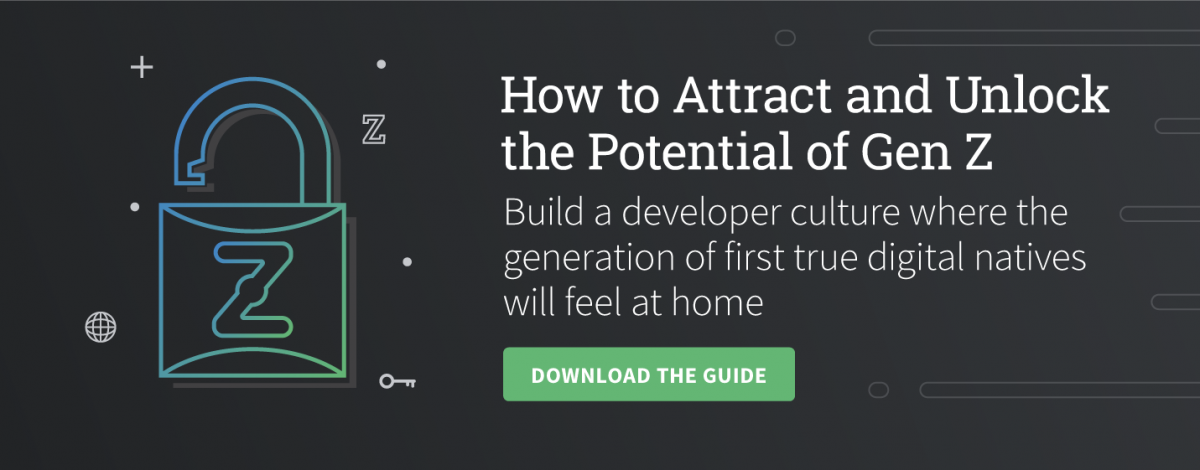A new generation is in the beginning stages of entering the workforce. Members of the Gen Z cohort, born between the mid-90s and early 2010 years, are now in their early 20s and seeking out entry-level careers.
Everyone in the workforce today has the potential to serve as a mentor to younger hires. By empowering them to perform their best, organizations have the potential to solve bigger problems, faster.
As the first generation of true digital natives, Gen Z has a unique perspective, in that technology is a core part of their identity. As a result, skills such as programming, data analysis, and design are second-nature to them, according to research from Handshake, a professional social network of 14 million Gen Z professionals and recent grads.
“Early talent may not realize it yet, but they’re going to have a big impact in the world — a world that’s evolving at a faster pace than it ever has in human history,” says Handshake.
So how do you bring out the best in them, in a way that makes your workplace better?
Become an advocate for entry-level hires
Young professionals are new to the workforce and need guidance in their early years to succeed long-term. It’s critical that the technology sector embrace these young adults with open arms — and not repeat patterns that have adverse outcomes on generational inclusion at work.
Think back to 10 years ago when millennials, now in their late 20s and 30s, entered the workforce. Older cohorts gave them labels like entitled, selfish, and lazy. The ripple effect of this destructive dialogue resulted in conflict, negativity, and tension at work, which in part has fueled trends around burnout and employee disengagement.
Millennials are known to be a generational cohort with high levels of anxiety. Among Gen Z, stress levels are even higher, with young people reporting that they feel a higher sense of loneliness, too. Gen Z, especially, does not respond well to conflict.
Be a shepherd, not a bully. Gen Z’s success at work is good for everyone. Consider building the following learning and development initiatives to support this goal:
- Mentorship programs
- Lunch and learns
- Skill development programs
- Rotational programs to learn from other teams
These initiatives are crucial, given that Stack Overflow has found that 80% of developers say that code is a hobby, working on projects after their time at work.
Understand their values
Gen Z is bringing their attitudes around social responsibility to work.
According to McKinsey, 9 out of 10 members of this generation believe that companies have a responsibility to address environmental and social issues. Research from Handshake has also found that67% of Gen Z will only consider working for a company that has a clear thesis around diversity and inclusion.
That’s a stark contrast compared to other generations that predominantly make up the world’s workforce — in Stack Overflow’s 2019 Developer Survey of 90,000 programmers, only 6.8% consider the diversity of a company to be an important job factor. But diversity is known to be good for organizations overall: research has consistently shown that companies that prioritize diversity consistently outperform those that don’t.
What these trends suggest is that companies are going to need to change their attitudes. To be successful in the Fourth Industrial Revolution Economy, companies that embrace diversity are in the best position to remain competitive in the market.
With respect to achieving diversity and inclusion goals — and revenue goals — companies have a lot to learn from their Gen Z hires.
Give all employees the opportunity to carve their own path
Gen Z is what McKinsey calls “identity nomads” because they are always experimenting with different ways of being themselves.
“For them, the self is a place to experiment, test, and change,” explain Tracy Francis and Fernanda Hoefel in an article for McKinsey. “Seven out of ten Gen Zers say it is important to defend causes related to identity, so they are more interested than previous generations have been in human rights.”
For this reason, younger hires have the potential to offer mentorship to older generational cohorts that may be interested in pursuing new career directions, themselves.
The tech sector is experiencing an accelerated rate of change — recent grads come to the table with the technical skills that are necessary to help entire organizations perform better.
When Gen Z is empowered to lead, organizations have the potential to grow — which means that all employees have the potential to learn new skills and step into new roles.
Final Thoughts
Recent grads, with the skills and values that they bring to the workforce, have the potential to become a new heartbeat of organizational transformation. When companies gain efficiencies and technical capabilities, all employees have the potential to benefit. When new hires succeed, everyone else reaps the benefits. Embrace their talents, and learn to look past their weaknesses as personal strengths.
This ebook will help you do exactly that.

